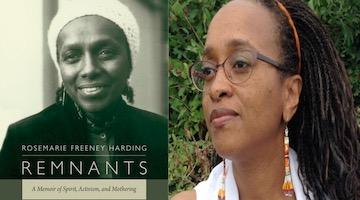Stepping into the folds of this book one begins a shamanic journey that is both an act of defiant and joyful resistance to patriarchal capitalist-coloniality.
“Through the layers and spirals of sacred text the dignity of a shared homecoming is prefigured.”
In this series, we ask acclaimed authors to answer five questions about their book. This week’s featured author is Sara Motta. Motta is Associate Professor at the University of Newcastle, NSW, Australia. Her book is Liminal Subjects: Weaving (Our) Liberation.
Roberto Sirvent: How can your book help BAR readers understand the current political and social climate?
Sara Motta: Liminal Subjects: Weaving (Our) Liberation offers ways to read the internal and external maps of soul-wounding, alienation and oppression caused by patriarchal capitalist-coloniality. Through her pages I bring to light and excavate from theses soul wounds and the realms of our knowing-being which we internally exile and which are represented as empty wastelands of non-being. I do not stop there however, for the stories and experiences shared, and analysis crafted, systematize and bring to thought the multiple and complex ways that raced and feminized communities and subjects are co-creating decolonizing and feminizing resistances. I demonstrate how these resistances offer an affirmative other revolutionary politics which transgresses such systems of binary thinking and alienated/ing politics (of knowledge) and the social relations and subjectivities upon which they are premised and (re)produced.
In the book I bring to enfleshed thought the experience of non-being and of violent (epistemological) denial enacted as an essential logics of the current system onto the bodies, minds and souls of raced and feminized subjects and communities. I center trauma as systemic and structural and map out pathways of healing liberation and self-determination. Stepping into the folds of this book one begins a shamanic journey that is both an act of defiant and joyful resistance and decolonial and feminizing revolutionary creations. Liminal Subjects is a living, breathing text. She embodies an encounter of recognition for those of us who for so long have been trapped between the gaze of hypervisibility -- always subject to violent interventions to order, tame, develop, control -- and of invisibility as knowing-being subjects.
Through analysis, stories, rituals and sonnets I articulate and enflesh a collective visibility and voice on our own terms. This is a voice and visibility that refuses the violent offerings of assimilation and onto-epistemological denial of the logics, rationalities and relationalities of patraichal capitalist-coloniality. Through the layers and spirals of sacred text the dignity of a shared homecoming is prefigured, as we recognize and hear our stories (re)told, we take back the word and return her to the world, and together excavate from our wounds the keys to our healing liberations.
I foreground the urgency and necessity of decolonizing the violent containments of Rationality and Reason which underlie both hegemonic and often radical renditions of the political and demonstrate that through this process of decolonization we can find the means and the magic with which to bring down the borders which for so long have separated and exiled us from ourselves, each other and our living cosmos.
What do you hope activists and community organizers will take away from reading your book?
I hope the book speaks to those on the margins of movements, theorizing and political power and their experience of how ‘radical’ and ‘revolutionary’ movements can (un)consciously reproduce the very logics, relationalities and rationalities which we are trying to transform. I hope it is able to offer the means to strategically think, give name to, and then concretely transform these (internalized) dynamics into a politics beyond the violent hierarchical divisions and binaries of our present system.
I offer therefore stories and experiences which can be dialogued and communed with to support the critical reflexivity and feminized/ist decolonizing of our radical political spaces, practices and movements. The work supports in the development of La Facultad, the capacity to see invisible dynamics of power and, then to shift the relationships and subjectivities that reproduce the violent logics and rationalities of patraichal capitalist coloniality in our everyday lives and political struggles.
In the work I also offer recognition and honoring of the everyday feminized work of healing liberations which is so often derided, devalued and invisibilized. Instead I centre a politics of love, care, stillness, silence and the cyclical and offer practices, stories and strategies with which to embed this in our politics and/as everyday live.
We know readers will learn a lot from your book, but what do you hope readers will un-learn? In other words, is there a particular ideology you’re hoping to dismantle?
Through the book I hope to bring to thought the ways in which the logics and rationalities of patraichal capitalist-coloniality can insidiously and silently embed themselves in our ‘radical’ practices, relationships and politics of knowledge. Readers can journey to identify and bring to thought how and if these binary and alienating/ed logics and rationalities criss-cross their struggles for revolutionary change and decolonizing liberations.
They are invited to learn to unlearn the logics of patriarchcal capitalist-coloniality that we have internalized and the ways this becomes manifested in a fetish of carelessness, the event, linearity, separation and alienated social practices, and authoritarian and abusive political and epistemological relations that so often underpin and are reproduced in revolutionary politics.
In particular, there is a questioning of the myths and figures of critical and orthodox leftist traditions, which reinforce a representative politics and epistemology enacted through the figures of the Prophet, Guru and Warrior.
Maps, visions, experiences and practices are shared which support the unlearning of the hierachical binaries and splits between mind/body, flesh/philosophy, feminized/masculinized, nature/man, amongst others, embedded within these revolutionary mythologies and figures. This allows an opening to our capacity to re-myth the world and co-create new figures of decolonizing and feminized revolutionary politics, through the Storyteller-Medicine Woman, the Guardian-Gardener and the Priestess Shamanka. This enfleshes into word and imagination the possibilities of a politics (of knowledge) that moves beyond the binary thinking and coordinates of thought, knowing and being-becoming that are currently hegemonic and which can render ‘our’ politics a mirror image of that which we seek to transform.
Who are the intellectual heroes that inspire your work?
The decolonizing and feminized revolutionary politics (of knowing-be-ing) brought into flesh through the book is premised on the sentipensamiento that “we are the ones we have been waiting for.” This means that my biggest intellectual heroines are the women and men who people the pages of the book -- with their struggles, stories, philosophies, methodologies, practices, songs, poems, rituals and capacity to dive deep into the wounds of patraichal capitalist-coloniality to find the magic with which to bring balm to these wounds and transform our communities.
I also stand on the shoulders of my grandmothers, Antoinette and Lucrecia, and my great grandmothers across the lineages of the three lines at the crossroads of possibility that I transmit. The ancestors, in particular of my maternal lines, with all their stories of exile, pain and abuse, and those of survival, protection and resilience were my anchor. Along with them sits Karen Louise Blake, a lost sister, due to the invisibility and invisibilization of her trauma as a result of state violence and intimate partner violence within the ‘activist’ world.
They supported me to enflesh philosophy, return the word to the womb and center poetry as critique. They drummed from deep time and infinite space and gave me permission to speak, to unreal the knots to my knowing-being that I had carried for so long, and to come into visibility in my own terms, and to acknowledge my/our right to healing, freedom, joy and voice, our voices.
Weaved into this magnificent array of everyday philosophers, priestess -- Shamankas, and revolutionary poetesses were the vision -- enfleshed-thoughts of philosophers who emerge out of their attempt to speak the unthought of the raced and feminized including Gloria Anzaldua, bell hooks, Maria Lugones, Audre Lorde, Luce Irigaray.
In what way does your book help us imagine new worlds?
This book offers a lantern of multiple colors, shades and textures with which to find the magic in the darkness of the Black Medusa, the racialized and feminized that is the negated underside of patriarchal capitalist-coloniality and much ‘revolutionary’ thought and practice.
Through the chapters it allows an unfolding to deeper layers through which we can foreground our homecoming to our selves and communities, and like this recover our inner sovereignty. This is the ground out of which our struggles for outer sovereignty and self-determination are held. This ensures that in the name of liberation we do not reproduce the alienation, death and dehumanization co-constitutive of our current society.
The maps illuminated, the pathways suggested and the steps shared offer a multi-dimensional set of revolutionary practices and strategies, open possibilities of decolonizing and feminized enfleshed thought and suggest multiple grounds of epistemological becoming with which to weave our healing liberations.
Roberto Sirvent is Professor of Political and Social Ethics at Hope International University in Fullerton, CA. He also serves as the Outreach and Mentoring Coordinator for the Political Theology Network. He is co-author, with fellow BAR contributor Danny Haiphong, of the new book, American Exceptionalism and American Innocence: A People’s History of Fake News—From the Revolutionary War to the War on Terror.
Comments?
Please join the conversation on Black Agenda Report's Facebook page at http://facebook.com/blackagendareport
Or, you can comment by emailing us at comments@blackagendareport.com



















